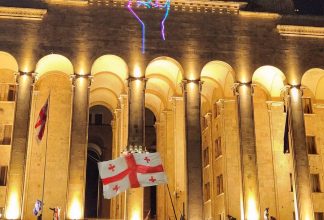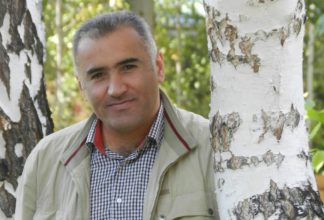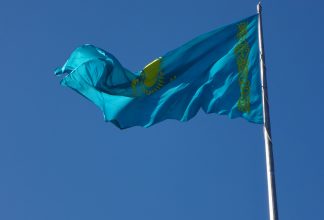UN’s António Guterres Must Stand Up For Human Rights in Central Asia
Civil Rights Defenders urges the UN Secretary-General António Guterres to use his visit to the five nations that comprise Central Asia, to publicly advocate for human rights. We also call on the Secretary General to demand an end to the ongoing violations and for the immediate and unconditional release of imprisoned activists and journalists.
Guterres began his Central Asia tour on 07 June and is due to visit every nation in the region over the course of a few days.
“We urge Secretary General António Guterres to use his first visit to the region to publicly call on each and every president in the region to put an immediate end to their governments’ repressive policies and release all our imprisoned colleagues as a first step to overturning each of the nations’ troubled human rights record,” said Joanna Kurosz, Eurasia Programme Director, Civil Rights Defenders.
Although each of the regional countries that Guterres is set to visit – Kazakhstan, Kyrgyzstan, Uzbekistan, Tajikistan, and Turkmenistan – are signatories to numerous UN treaties and statutes on human rights and have respective national legislation protecting these rights, all of the governments continue to adopt restrictive laws and have been implicated in carrying out wide ranging human rights abuses.
In all five nations law enforcement and security services – agencies tasked with ensuring rule of law – have been accused of fabricating criminal cases against government critics and political opponents, using arbitrary detentions and torture, and also have been implicated in the killing of unarmed civilians with impunity in the cities of Andijan (Uzbekistan, 2005), Osh (Kyrgyzstan, 2010), and Zhanaozen (Kazakhstan, 2011).
The list of other violations that the UN Secretary-General could also address is a long one; forced child labor during the cotton harvest campaigns in Uzbekistan and Turkmenistan; domestic violence and forced marriages (bride kidnappings in Kyrgyzstan); regional-wide discrimination against LGBT couples and the criminalisation of homosexuality (Uzbekistan and Turkmenistan); severe restrictions on freedom of speech and expression (at least 9 journalists behind bars in Kazakhstan, Kyrgyzstan, and Uzbekistan).
Civil Rights Defenders calls on the Secretary-General to publicly raise the following issues which clearly highlight the extent and nature of the ongoing violations in the region:
In Kazakhstan: Seytkazy Matayev, Head of the Kazakh Journalists’ Union, and his son Aset Matayev, Director of the independent KazTag news agency were imprisoned in Kazakhstan in October 2016 on accusations of tax evasion and the embezzlement of state funds that they and their many colleagues have denied, and have claimed to be politically motivated and fabricated. There is very little doubt that the imprisonment of Seytkazy Matayev from the Journalists’ Union has sent a chilling message to the rest of the nation’s already struggling media community and has greatly contributed to self-censorship in newsrooms across the country.
In Kyrgyzstan: Azimjon Askarov, a local human rights defender and journalist was sentenced to life in prison, in September 2010, in retaliation for his exposés on numerous abuses committed by the Kyrgyz police and prosecutors and also his reporting on the 2010 ethnic clashes in southern Kyrgyzstan. After reviewing his case, the UN Human Rights Committee ruled in April 2016 that Kyrgyzstan must immediately free Askarov and quash his convictions due to numerous violations that occurred during the case, which included torture and a clear lack of evidence to substantiate the charges. Instead of complying with the ruling, the Kyrgyz authorities put Askarov through yet another trial which upheld the guilty verdict.
In Uzbekistan: Yusuf Ruzimuradov, a local journalist is believed to be the longest imprisoned reporter in the world. Ruzimuradov was jailed along with his Editor, Muhammad Bekjanov in March 1999, following their extradition from Ukraine where the two lived and produced the opposition newspaper Erk. The Uzbek authorities accused the two reporters on a number of politicised and fabricated anti-state charges. Whereas Bekjanov was freed earlier this year after completing two consecutive sentences, Ruzimuradov continues to languish in prison to this day.
In Tajikistan: Buzurgmehr Yorov and Nuriddin Makhkamov, two local lawyers were convicted and sentenced to lengthy jail terms in retaliation for their commitment to human rights and rule of law. The authorities arrested Yorov in September 2015 only days after he agreed to represent in court the now imprisoned high-ranking members of the former legal Islamic Renaissance Party of Tajikistan. Mahkamov ended up in prison a few weeks later, after he announced that he would defend Yorov. Both lawyers were slapped with numerous politically motivated charges including fraud, extremism, and incitement to hatred, and as a result each received a sentence of more than 20 years in prison in October 2016.
In March 2017, Tajik prosecutors levied the already-imprisoned Yorov with a further two years in jail for allegedly insulting the president, and are reportedly considering whether to file another criminal case that would increase his sentence up to a possible 29 years. The two lawyers’ imprisonment demonstrates the pinnacle of the repressions against the human rights defenders’ community in Tajikistan.
Turkmenistan is infamous for being as repressive and closed as North Korea, and its regime does not tolerate any form of free speech, civic activism or political opposition. Repressions carried out by two of its presidents, the late Saparmurat Niyazov and Gurbanguly Berdymukhamedov, the current leader, have sent thousands into exile or jail on fabricated criminal charges. Those who faced prosecution were denied due process and have been denied all communication with the outside world. While meeting with Berdymukhamedov the UN Secretary-General should endorse and highlight the joint campaign initiated by the relatives of those who are jailed and urge the Turkmen president to prove that those imprisoned are still alive. He should also demand that the president takes the necessary steps to release prisoners and also grants access to human rights groups to enter the country – and to reverse his government’s abysmal human rights record.


